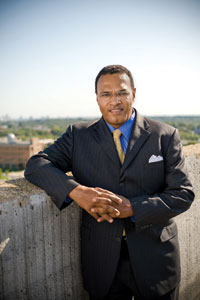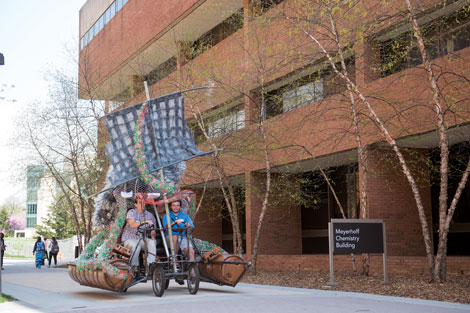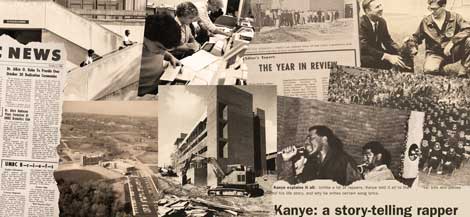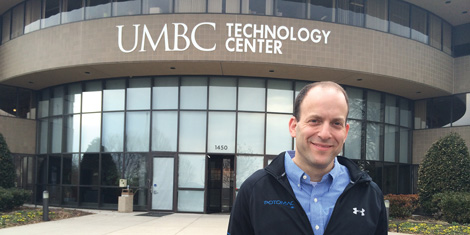 UMBC President Freeman A. Hrabowski, III, takes your questions.
UMBC President Freeman A. Hrabowski, III, takes your questions.
“Was there ever a time when asking a question had a tremendous impact on your life or changed its course?
— Monica Berron ’13, media and communications studies
Yes. When, as a child, I was in a math program on a college campus and a professor asked the class a question that no one
could answer.
The rest of the class became very upset, because the professor told them: “When you can answer the question, come and see me.” The students complained: “You’re the teacher. You’re supposed to tell us the answer.”
I watched how they spent their time focusing on how angry they were because that teacher wouldn’t give them the answer. And all of a sudden, I had this magical moment. I realized that the professor didn’t give us the answer because he had confidence that we had the answer within ourselves. He wasn’t worried about our getting the answer quickly. He was much more interested in us pushing ourselves to struggle, to figure it out on our own.
So I decided to try to convince my classmates to focus our attention on the power within ourselves. It was very hard, because I didn’t have a clue about how to solve the problem and neither did they. But several things became clear in that experience. First, you don’t do your best thinking when you’re angry. Sometimes anger can motivate you. But you have to get beyond the anger to clear your head in order to do your best thinking. Number two, you have to believe you really can achieve the goal. Number three, you have to be resourceful.
What the professor was teaching us was to be resourceful. To do research, as opposed to simply writing down what’s on the board, which is what we’d done all of our lives. And so we had to ask questions. Try different approaches. Slowly, we began to see, and after a couple of days, we saw the light. That was a magical moment for me. I’ve never forgotten the lessons I learned that summer.
I see the power of questions so often with our faculty. I remember going to Mike Summers, our distinguished university professor of chemistry, when I was concerned about one of my students who had earned a B in a course. I remember saying to him that the student wouldn’t be able to get into graduate school with that level of work. And Mike said to me: “Freeman, the grade is okay. What’s important is that she’s really curious. One of the reasons she’s earning the B is that she’s working so hard in the lab, because she’s passionate about her questions. So she may not be getting an A, but that really isn’t what’s most important. What’s important is she’s really excited about the questions, and she’s persistent in seeking answers.” I’ll never forget him saying that to me.
Wendy Salkind, one of our professors of theatre, is another person who comes to mind. Often after seeing a production, I will talk to Wendy about what I liked about the show, and I ask her about parts of it that I didn’t necessarily understand. Wendy is always a teacher in the best sense of that word. Wendy always listens. And often she smiles and says: “Freeman, I’m not concerned that you didn’t understand this fully. I’m simply delighted that you’re asking a question about it.”
What Wendy is saying is that the production exists to get people to think. That’s what we’re doing here in theatre, and in many other ways, all the time. We challenge people to think about life and the challenges that we all face – challenges that inevitably raise hard questions.
As people come to our campus to visit, especially as we approach our 50th anniversary in 2016, I hope that what they see will lead them to ask questions about the importance of higher education in the development of America, and also in the development of families and individuals. That really is the whole purpose of UMBC. We exist to help people dream about the possibilities and then reach those dreams.
Just visiting our campus and understanding how we have grown and developed gives people the chance to think about the transformation of their own lives. People come back and see that this campus has changed physically. They can’t help but think about how the changes on the campus – in some way or another – are connected to the changes in their own lives.
They say, “The place doesn’t look the same. I don’t know where I am.” Then they think: “Well, when I was here, what did I look like? Who was I? Who am I now?” Pondering the evolution of this campus gives each of us a chance to put the mirror up to ourselves.
To send a question to President Hrabowski, visit Ask the President.
Tags: Fall 2015




